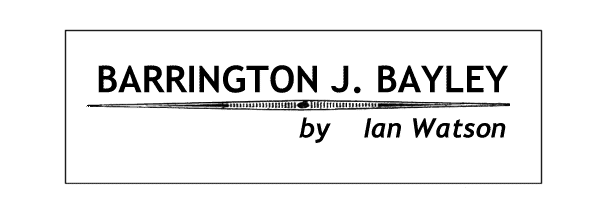

This article is available here by kind courtesy of the author. Originally published in the book "20th Century SF Writers", in 1981. Copyright Ian Watson, 1981-1998.Barrington John Bayley is author of a number of sui generis short stories and of equally sui generis novels His stories introduce, with a conjuror's panache, whole alternative ontologies. What if the universe were composed of solid rock, and worlds were hollow spaces within it ("Me and My Antronoscope")? What if a ship could literally sail the ''surface" of space just as we sail the surface of the sea? What, then, would our own astronauts' fish-eye-view be of such a ship sinking (''The Ship That Sailed the Ocean of Space")? His yoking of metaphysical speculation with pulp adventure themes - sometimes stylized, sometimes natural - is reminiscent of Borges's intersection of detective and horror formulas with metaphysics For the philosophers of Borges's subjective planet which displaces ordinary reality (in ''Tlön, Uqbar, Orbis Tertius'') "metaphysics is a branch of the literature of fantasy". For Bayley, likewise (or perhaps more truly for Bayley, fantasy, including SF, is a branch of metaphysics!). His novels are thus metaphysical space operas, drawing upon the grand old pulp tropes of space battles - groaning over-drives, the dense worlds of the Hub, intrepid captains, cynical adventurers with pearl-handled laser pistols - and transmuting the cosmic ding-dong into a witty, technicolour, eccentric, experimental philosophy.
Thus in Star Virus space freebooters capture a crystal ball constructed by ancient alien beings - or by extra-dimensional entities - which contains the original of our own galaxy within it, ours being merely the macroscopic copy. (The novel ends with the lovely rallying cry, not parody so much as perfect simulation: "Did you hear that, you trash? Do you know where we're going? Andromeda! Andromeda!'') Star Winds presumes that all our contemporary science is a looney misconception and that the ether actually exists - so that one can sail schooners and windjammers from world to world; not boring old ram-jets but proper sailing ships - and, what's more, that the alchemists were right about the nature of reality after all, so that the philosopher's stone can be achieved. The Garments of Caean develops the old adage that "clothes make the man" into the ultimate persuasive absurdity of sentient suits which control people and are part of a galactic takeover by vegetable fibre - tossing in, along the way, cultures who aren't even aware that they possess bodies. The Soul of the Robot explores the Lemian theme of existential cybernetics, by way of a quest, while its climax - though ironic - contains a note of un-Lemian transcedence (as does Star Winds, with its achievement of the alchemist's goals) true to the pulp tropes but true also to the exuberant metaphysical playfulness of Bayley.
- Ian Watson, 1981